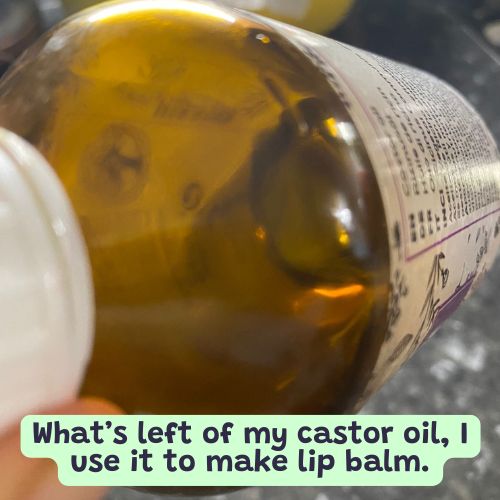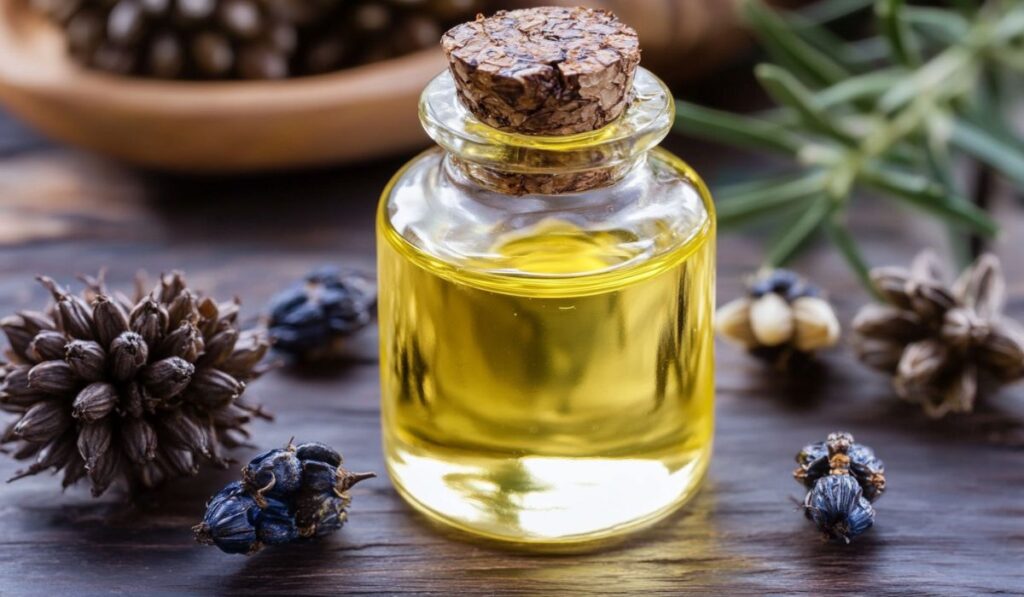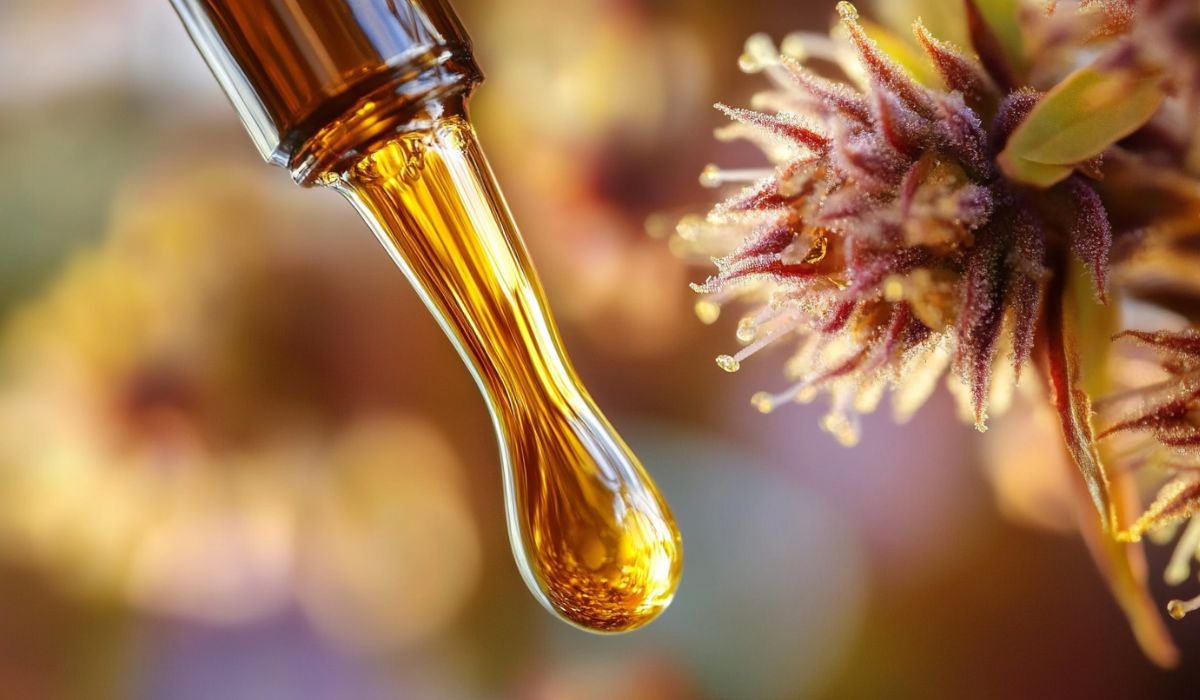Castor Oil: Myth OR Reality? Here’s the Truth
It’s hard to miss.
Open any social media app, and you’ll see post after post praising castor oil.
This (truly) ordinary oil has become incredibly popular, with many people claiming it can solve ALL SORTS of beauty and health problems.
Hm. Let’s take a moment to think about this.
In the rush of social media trends, it’s easy to get caught up in the excitement. One day, a simple ingredient becomes popular, and suddenly everyone thinks they’ve found a miracle cure.
Castor oil is just the latest “wonder product” that social media users say can fix everything from hair loss to skin issues.
However, the truth is often quite different from what we see online.
As a certified skincare formulator, I’m always on the lookout for that “wonder” ingredient—many natural ingredients truly are wonderful! But I’m also sceptical and cautious when so many claims are made about a single product, like castor oil.
In this article, I’ll take a closer look at the castor oil trend. We’ll sort out what’s true and what’s not, look at the real benefits as well as the overblown claims, and try to understand why this particular oil has become so popular.
Whether you love castor oil or you’re not sure what to think, this article should give you a clearer picture of what this trendy oil can AND can’t do.
I hope this helps you make the right choices.

We can’t miss talking about the history
Castor oil isn’t new. Not by a long shot.
This thick, sticky oil has been around for thousands of years. Ancient Egyptians were using it way back in 4000 BC. They burned it in their lamps and even used it to help with troublesome pregnancies.
Fast forward to today, and castor oil is everywhere. It’s in your lip balms, shampoos, and even some medicines. But somewhere along the line, it got a “major upgrade” in public opinion.

How did we get from ancient lamp oil to the supposed cure-all of the 21st century?
Simple: social media turned castor oil into a SENSATION.
Influencers and beauty gurus started raving. Luscious locks. Flawless skin. You name it. Suddenly, everyone was slathering it on, hoping for miracles.
Perhaps you’re one of them. Maybe you swear by it. Or maybe you’re wondering if you’re missing out on some sort of wonder oil…
Either way, time to dig into what castor oil really is and what it can (and can’t) do for you.

So, what CAN castor oil ACTUALLY do?
Alright, let’s cut through the hype and get down to the nitty-gritty.
What can castor oil really do for you?
Yes, it can keep skin hydrated
First off, it’s a pretty decent moisturiser. Thanks to its high concentration of ricinoleic acid, castor oil can help keep your skin hydrated.
Ricinoleic acid has some anti-inflammatory properties. This means castor oil might help calm angry, red skin. Don’t expect miracles, but it could help your skin if it’s showing some irritation or redness.
Yes, it can improve scalp health
Now, about that hair growth claim you’ve probably heard… Well, let’s say there’s a kernel of truth there. Castor oil can improve the health of your scalp, which in turn might promote better hair growth.
So far, so good. Like many oils, castor oil has many benefits attached to its name.
Let’s keep going.

Common claims vs. reality: let’s set the record straight!
Right, let’s roll up our sleeves and dig into the juicy bits.
What are people saying about castor oil, and what’s actually true?
Get ready, because we’re about to separate the wheat from the chaff.
**While the “claims” below are not linked to examples, we’ve all heard them. If you haven’t please watch out on Tik Tok, Youtube, Facebook, Instagram… you’ll always find someone claiming one or more of the below, trust me.
“Castor oil will make your hair grow like crazy!”
Oh, if I had a coin for every time I’ve heard this one. Yes, castor oil can indeed help with hair health. It’s got ricinoleic acid, which can improve blood circulation to your scalp. Better circulation means stimulated hair follicles. But hair growth is complex and depends on many factors. Castor oil might help, but it’s not the magic potion many claim it to be.
“Castor oil will give you thick, luscious eyelashes!”
Castor oil may condition your eyelashes and eyebrows, which can make them appear fuller and healthier. However, it won’t actually make new lashes sprout. Your lashes, like the hair on your head, have a natural growth cycle. Castor oil can’t change that, no matter how much you wish it does.
The “thick, luscious” eyelashes effect explained: basically, there’s a moisturising effect. The oil can coat the lashes and brows and provide moisture and prevent breakage. It can also make each individual hair appear slightly thicker because of the coating effect, creating the illusion of fuller lashes or brows. This coating also can reduce fallout of the hair which falls because of dryness or brittleness… But there’s no scientific evidence of “new growth” or the oil stimulating new hair follicles or speeding up growth… any fullness or thickness is temporary. When you wash it off, the effect diminishes.
“Slather on castor oil, and watch your acne disappear!”
Hm. Not really. Not like that. Yes, castor oil has some antimicrobial properties, which sounds great for acne. But this oil is also quite thick and CAN clog pores. For some people, especially those with oily skin, it might actually make acne worse. It’s not a one-size-fits-all solution.
“Use castor oil to banish stretch marks!”
While castor oil is moisturising (locking in moisture) and can improve skin elasticity to some degree (like many other oils), it’s not a miracle worker for stretch marks. These skin changes run deeper than castor oil can reach. It might help a bit with the appearance (again, like many other ingredients, take shea butter for example), but don’t expect them to vanish completely.
“Castor oil cures everything from arthritis to cancer!”
While castor oil does have some anti-inflammatory properties, claiming it cures serious diseases is a bridge too far. It might offer some relief for minor aches and pains, but it’s not a substitute for proper medical treatment. Always, always consult your doctor for serious health concerns. Check out this article.
“It’s natural, so it must be safe!”
This one is a recurring one with so many ingredients. Yes, castor oil is natural. But so is poison ivy. Natural doesn’t automatically mean safe or good for you. Some people can have allergic reactions to castor oil, and ingesting large amounts can actually be harmful.
So there you have it.
Castor oil isn’t useless, far from it.
But it’s not the miracle cure that some corners of the internet would have you believe.
It’s a useful tool in your beauty and health toolkit, but not a magic wand.
Remember, if something sounds too good to be true, it probably is.
The not-so-rosy side of castor oil: risks and side effects
Let’s talk about the not-so-good.
(Please read the “Risks and side effects of castor oil” section in this article by Cleveland Clinic.)
1. Skin irritation
Yes, castor oil is often used in skincare for its moisturising and anti-inflammatory properties, as we saw above.
However, it’s not always gentle on the skin. For some people, applying castor oil can lead to skin irritation, which may manifest as redness, itching, or even a rash.
I’ve had MANY people come to me to complain about these outcomes from using the oil.
These reactions can be particularly problematic for those with sensitive skin or allergies.
2. Allergic reactions
Allergic reactions are another concern when using castor oil.
For some people, their immune system treats castor oil like it’s something dangerous. This can cause anything from a mild rash to more serious issues, like trouble breathing. If you start experiencing symptoms like shortness of breath or feel unusually tired after using castor oil, you should wash it off right away and consult your doctor.
To be safe, it’s always a good idea to do a patch test before using castor oil on larger areas of your skin. Apply a small amount to a spot on your arm and wait 24 hours to see if any redness, itching, or swelling occurs. If everything seems fine, then it’s likely safe to use, but if you notice any reaction, it’s best to avoid it.
Allergic reactions can be unpredictable, so it’s important to pay attention to how your body responds! If you ever feel something is off, seek medical advice IMMEDIATELY.
3. Other
Stomach troubles: If you’re thinking about taking castor oil internally (which I really don’t recommend without a doctor’s guidance), be ready for some potential side effects like diarrhoea, cramps, and nausea.
Dizziness and fatigue: Some people feel a bit dizzy or tired after using castor oil. If you start feeling unsteady or unusually tired, it might be time to rethink your use of castor oil. Check this article.
Interactions with medications: Castor oil can cause issues if you’re taking certain medications. It might interfere with blood thinners, diuretics, or other prescriptions. Always check with your doctor before combining castor oil with your regular medications.
Pregnancy concerns: Castor oil has been traditionally used to induce labour, so it’s best to avoid it during pregnancy unless your doctor specifically advises it.
Eye irritation: If you’re using castor oil around your eyes, like to enhance your lashes, be extra careful. If it gets in your eyes, it can cause irritation, redness, and a generally unpleasant experience. I love the title on this article “Castor oil doesn’t belong anywhere near the eyes”.
Now, don’t get me wrong. I’m not trying to scare you off castor oil completely.
For many people, it’s perfectly safe and can be beneficial. But it’s better you know about the above before making the decision of using it or believing everything they say (or think you’re missing out on the miracle cure).
My advice? If you’re thinking of jumping on the castor oil bandwagon, start small. Do a patch test. See how your skin reacts. Consult a dermatologist. Consult your doctor.
And if anything feels off, stop using it and consult a professional.
Castor oil vs other oils
Almost done! I just want you to see how castor oil “stacks up” against other oils, so you can find the right spot for it in your list of favourites.
The list below should help you quickly compare castor oil with other popular oils (oils rated 1 to 10 in how beneficial they are for that particular issue or concern, this will be VERY HELPFUL for you).
I hope it’s useful and helps you make informed decisions when buying oils for your beauty and skincare routine in the future!
Hair growth…
- Castor Oil: 6/10 – May improve scalp health due to ricinoleic acid content
- Coconut Oil: 7/10 – Penetrates hair shaft, reduces protein loss
- Argan Oil: 8/10 – Rich in vitamins and fatty acids, nourishes follicles
- Jojoba Oil: 7/10 – Similar to natural hair oils, may promote growth
- Rosehip Oil: 5/10 – Limited evidence for hair benefits, but moisturising
Moisturising properties…
- Castor Oil: 7/10 – Good but heavy, high in fatty acids
- Coconut Oil: 9/10 – Excellent for dry skin, rich in medium-chain fatty acids
- Argan Oil: 8/10 – Lightweight, good for all skin types, high in vitamin E
- Jojoba Oil: 9/10 – Very similar to skin’s natural oils, easily absorbed
- Rosehip Oil: 8/10 – Lightweight, easily absorbed, rich in vitamins A and C
Acne treatment…
- Castor Oil: 5/10 – Mixed results, may clog pores despite antimicrobial properties
- Coconut Oil: 6/10 – Antibacterial, but may clog pores for some
- Argan Oil: 7/10 – Non-comedogenic, may help due to anti-inflammatory properties
- Jojoba Oil: 8/10 – Non-comedogenic, regulates oil production
- Rosehip Oil: 8/10 – High in vitamin A, may help acne and reduce scarring
Eyelash growth…
- Castor Oil: 6/10 – May condition lashes, making them appear fuller
- Coconut Oil: 6/10 – Can help condition lashes and prevent breakage
- Argan Oil: 7/10 – Nourishes lashes with fatty acids and vitamin E
- Jojoba Oil: 7/10 – Conditions without irritation, closest to natural lash oil
- Rosehip Oil: 5/10 – Limited evidence for lash benefits, but nourishing
Ageing skin…
- Castor Oil: 6/10 – Some antioxidants, promotes collagen production
- Coconut Oil: 7/10 – Some antioxidants, moisturising, may reduce fine lines
- Argan Oil: 8/10 – High in vitamin E and fatty acids, potent anti-ageing properties
- Jojoba Oil: 7/10 – Mimics skin’s oil, may slow ageing by supporting skin barrier
- Rosehip Oil: 9/10 – High in antioxidants and vitamin C, promotes collagen
Stretch marks
- Castor Oil: 6/10 – May improve appearance slightly, promotes skin elasticity
- Coconut Oil: 7/10 – May improve skin elasticity and hydration
- Argan Oil: 7/10 – Rich in vitamin E, may improve skin elasticity and healing
- Jojoba Oil: 7/10 – Moisturises deeply, may improve skin texture and appearance
- Rosehip Oil: 8/10 – Promotes collagen production, may significantly reduce appearance
Safety!
- Castor Oil: 6/10 – Potential allergies, avoid ingesting, may cause skin irritation
- Coconut Oil: 8/10 – Generally safe, unless allergic, may clog pores for some
- Argan Oil: 9/10 – Few known side effects, suitable for most skin types
- Jojoba Oil: 9/10 – Rarely causes allergic reactions, suitable for sensitive skin
- Rosehip Oil: 8/10 – Few known side effects, but may not suit very oily skin
In a nutshell
1. Hair growth: While castor oil is popular, other oils like coconut and argan are also beneficial. They may not speed up hair growth but can reduce breakage and keep your hair healthy.
2. Moisturising: Castor oil is effective but heavy. For daily use, especially on oily skin, lighter oils like jojoba or argan might be better.
3. Acne treatment: Castor oil isn’t the best choice for acne-prone skin. Jojoba and rosehip oils are likely better options.
4. Eyelash growth: Oils can condition lashes, but none will magically make new lashes grow.
5. Ageing skin: While castor oil has some benefits, argan and rosehip oils offer more potent anti-aging properties.
6. Stretch Marks: These oils can help improve the appearance of stretch marks by moisturising and improving skin elasticity, but don’t expect miracles.
7. Safety: Castor oil has more safety concerns compared to the others, especially for sensitive skin.
So why of the castor oil craze?
After much thought, I’m genuinely amazed at how people have gone absolutely bonkers (crazy) for this oil.
I’ve come to believe that there are several reasons behind this castor oil mania.
See if you agree with me.
1. The social media snowball
First off, social media is a proper hype machine. One influencer posts about their “miraculous” castor oil hair mask, and suddenly everyone’s scrambling to get their hands on a bottle. And so on. And so on. And so on.
2. Nature’s gift (or so they say)
Then there’s the whole “natural is better” craze. People are going totally crazy over anything that doesn’t sound like it was cooked up in a lab. Castor oil? Sounds natural enough! Never mind that arsenic is natural too.
3. Penny-pincher’s dream cream
Here’s another reason why I think it’s gone viral: castor oil is cheap. In a world where some beauty products cost an arm and a leg, finding something affordable that promises the moon is like striking gold, in people’s minds.
4. When celebrities say “jump!”, fans ask: “How high?”
Celebrity endorsements have played their part too. When a famous face says, “This is my secret weapon,” fans listen. And buy. And slather it on everything from their eyelashes to their big toes. I’m not linking to any proof of what I’m saying because it might persuade you to buy it JUST on the endorsement! But you can Google it.
5. The power of “before-and-after”
Then there’s the power of before-and-after photos. They’re everywhere, showing hair transformations that would make Rapunzel jealous. Clever lighting, a good hair day, other products, taking good care of your hair in general (with or without castor oil)… can all be genuine reasons why the hair looks wonderful on the photo.
6. Old is gold… or is it?
There’s also this idea that if something’s been used for thousands of years, it must be good. Ancient Egyptians used it, so it must work, right? (Let’s ignore the fact that they also thought putting lead on their faces was a cracking idea.)
Ancient Egyptians may have been the first to plaster on killer cosmetics. Their exaggerated eye makeup (which trumped even the late Tammy Faye) was made of malachite (a green ore of copper), galena (lead sulfide), and, most famously, kohl, a paste made of soot, fatty matter and metal (usually lead, antimony, manganese or copper).
NBCNews
Ouch. The things some do for “beauty” is beyond me.
7. FOMO: The Ultimate Sales Pitch
Lastly, there’s the FOMO effect – FEAR OF MISSING OUT.
When everyone’s raving about something, it’s hard not to wonder if you’re missing out on the next big thing.
Have you experienced this? I have and I know what it feels like. So I know what I’m talking about. Spotting it is the key here so you don’t fall for it.
So there you have it. A perfect storm of social media, natural beauty trends, affordability, celebrity influence, wishful thinking, and good old FOMO.
It’s no wonder castor oil has gone viral.
But here’s the million-dollar question: Does its popularity mean it actually works wonders?
We’re about to separate the facts from the fiction.
Now you know about castor oil
Castor oil isn’t the liquid gold many claim it to be.
It’s just another tool in the beauty box – useful for some, not for others.
- It might help your hair and skin, but it’s not a miracle worker.
- There are risks – from mild irritation to proper allergic reactions.
- Other oils often do the job just as well, if not better.
The takeaway?
Don’t believe everything you see on social media. Your gran’s coconut oil might sort you out just as well as that trendy bottle of castor oil.
Remember: patch test, start small, and listen to your body.
In the end, castor oil is like that new song everyone’s raving about – worth a listen, but might not be your cup of tea.
Let’s see how much agro I get in social media from this article!
Til the next one x

